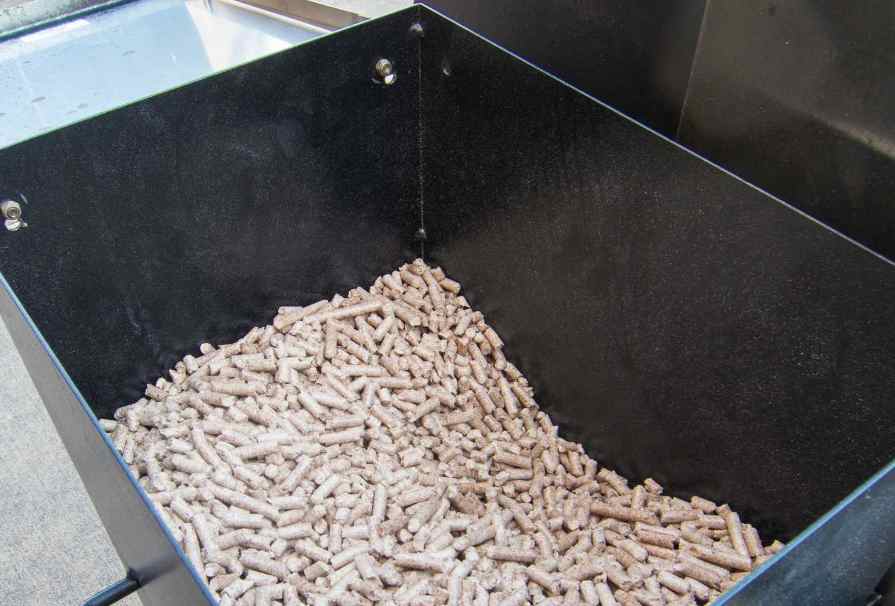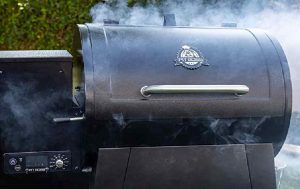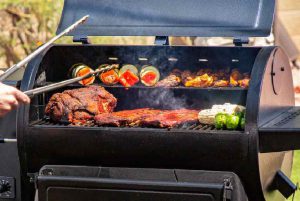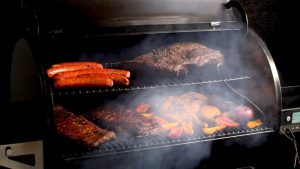As a pellet smoker owner, you might be curious if it’s possible to use your grill without pellets.
Join us as we investigate the necessity of wood pellets in pellet smokers and determine if they can function without them.
- What Is A Pellet Grill How Does It Work?
- Will a Pellet Grill Work Without Pellets?
- Running Out Of Pellets: What It Means For Your Smoker?
- How Long Do Pellets Last?
- Essential Tips For Storing Wood Pellets?
What is a Pellet Grill How Does it Work?
Pellet smokers are an innovative and efficient way to grill and smoke food with precision and ease.
To begin, load wood pellets into the storage container, known as the hopper.
An electric motorized auger then transports these pellets into the cooking chamber, where they are ignited by a hot rod.
No need for gas, charcoal, lighter fuel, propane, or matches just 100% natural hardwood fire within 4-5 minutes.
As the pellets burn, intake fans introduce air into the chamber, circulating heat and smoke throughout the cooking area.
This combination of heat and smoke infuses the food with that delicious smoky flavor we all know and love.
Unlike gas or wood grills, pellet smokers offer precise temperature control, with settings typically ranging from 180°F to 500°F.
This allows you to cook “low and slow” or crank up the heat for faster cooking.
Most pellet grills also come equipped with a meat probe that connects to the control board, making it easy to monitor the internal temperature of your food.
Some models even feature a patented SearZone plate and up to 8 different cooking options, providing even more versatility in your outdoor cooking adventures.
With a pellet smoker, you can enjoy the benefits of precise temperature control and delicious smoky flavors, all with the convenience of an electric system.
Will a Pellet Grill Work Without Pellets?
The short answer is NO, a pellet grill simply cannot function without pellets, as they serve as the primary fuel source.
If you receive a low pellet notification, it’s crucial to verify if it’s accurate or if it’s due to “tunneling.”
Tunneling occurs when pellets are consumed unevenly from the hopper, creating a funnel-shaped void in the middle.
If you notice tunneling, you can stir the pellets with a spoon, but if it’s a recurring issue, you may need to inspect your hopper for damage or blockages.
Related >>What Should You Do if Your Pellet Grill Runs Out of Pellets While Smoking?
Running Out of Pellets: What It Means for Your Smoker?
Running out of pellets can cause a significant temperature drop and even a fire. If your pellet smoker runs out of pellets, don’t panic.
First, check the grill’s temperature. If it’s stable, refill the hopper and continue smoking. If the temperature has dropped, remove the food and place it in a warm oven while you address the smoker.
Wait for the grill to cool, then remove the baffle, drip tray, and grate to ensure the firepot is clear of pellets.
Restart the grill, prime the auger with pellets, and after turning it off, replace the components before turning it back on to continue smoking.
As pellet smokers rely solely on pelletized wood as fuel, it’s essential to always have a sufficient supply of pellets on hand to prevent temperature drops or potential fires.
How Long Do Pellets Last?
Understanding how long pellets last is essential for a seamless grilling experience.
The longevity of pellets depends on factors like the fire’s heat, pellet brand, smoker insulation, weather conditions, and storage methods.
In general, high-heat cooking consumes about four pounds of pellets per hour, while slow cooking uses around two pounds per hour.
High-quality pellet brands tend to last longer and burn slower, and well-insulated grills also contribute to slower pellet consumption.
Cold weather can cause pellets to burn faster, as they need to work harder to produce heat.
Proper storage is crucial for maintaining pellet quality. Pellets should be stored indoors, off the ground, and in a dry container.
With proper storage, pellets can have an incredibly long shelf life of years. However, if exposed to water or moisture, their quality can degrade quickly.
To check if a pellet has gone bad, pick it up and assess its texture. If it feels wet, crumbles easily, or turns to mush, it should not be used in your pellet smoker.
By storing your pellets properly and monitoring your grill during cooking, you can enjoy a hassle-free grilling experience.
Related >>How Long Do Pellets Last?
Essential tips for storing wood Pellets?
To keep your wood pellets in prime condition, follow these crucial storage guidelines:
1. Opt for a moisture-free storage area:
Dampness can impair wood pellets’ burning efficiency, impacting both smoke production and temperature control.
To prevent this, store your pellets indoors or in a location shielded from humidity.
2. Don’t rely on the original packaging:
Even indoors, air moisture can be an issue. Use a 5-gallon container with a secure lid to keep your pellets cool, dry, and fresh.
3. Examine your pellets before using them:
Assess a few pellets for their luster and solidity. If they’re glossy and snap easily, they’re still fresh and good to go. If not, it’s time to replace them.
4. Store away from heat sources:
Since wood pellets are highly combustible, keep them at a safe distance from high-temperature areas like vehicles or water heaters, even if they’re still in their original packaging.
5. Clear the hopper after each use:
Leaving unused pellets in the hopper exposes them to the elements, leading to degradation.
Many pellet grills come equipped with a hopper cleaning feature, allowing for easy clean-up and flavor swapping.
After cooking, empty the hopper and store any remaining pellets in an airtight container to prolong their lifespan and avoid potential auger blockages.
Final Thoughts
As we’ve discovered, pellet smokers rely on wood pellets as their main fuel source. Operating without them is not an option, so always have extra pellets available to ensure you can enjoy delicious smoked foods without interruption.
>> Visit our extensive BBQ guides page for more articles that are similar to this one.
Greetings! I’m Chad, a 43-year-old barbecue aficionado hailing from the beautiful state of Texas. I’m thrilled to invite you on a culinary journey as we explore the art of grilling and smoking together. Through this blog, I aim to ignite your passion for barbecue by offering:
Scrumptious, time-honored BBQ recipes passed down through generations, guaranteed to tantalize your taste buds.
Expert guidance on mastering the grill, smoker, and diverse cooking techniques to elevate your barbecue game.
Recommendations on choosing the perfect tools and equipment tailored to your grilling requirements.
An inside look at the latest trends, innovations, and advancements in the ever-evolving world of barbecue.





